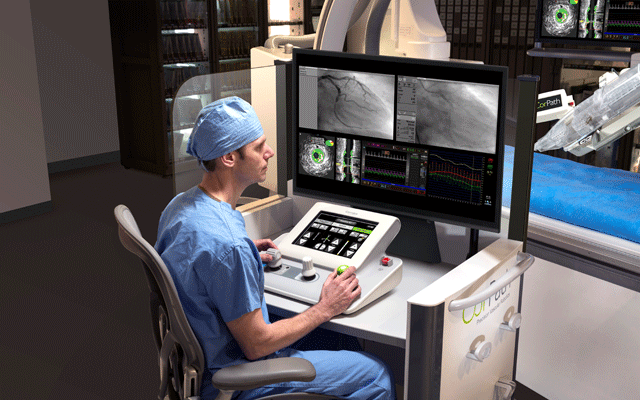
CorPath technology has been successfully used in the first-in-human telerobotic intervention study in India; the study is assessing the efficacy and safety of conducting percutaneous coronary intervention (PCI) from a remote location outside of the catheterisation lab. Five patients located at the Apex Heart Institute in Ahmedabad, India, underwent an elective PCI procedure from a distance of roughly 20 miles (32km) away.
Each procedure was remotely performed by Tejas Patel (Apex Heart Institute, Ahmedabad, India) from inside the Swaminarayan Akshardham temple located in Gandhinagar (India). His partner, Sanjay Shah, was in the room with the patient at the Apex Heart Institute. The success of this study paves the way for large-scale, long-distance telerobotic platforms across the globe.
Geographic barriers, socioeconomic status and a rapidly shrinking number of skilled specialists significantly hinders patient access to timely, specialised cardiovascular care. This is especially of concern during highly emergent medical events, such as heart attack and stroke, where ideally treatment is received in as little as 90 minutes or within 24 hours, respectively, to avoid death or permanent disability.
To improve patient outcomes, a press release reports, Corindus has pioneered the world’s first remote telerobotic interventional platform to deliver highly specialised and timely cardiovascular care to under-served patient populations with geographic barriers to treatment. Following the successful first-in-human telerobotic coronary stenting cases performed in India, the company plans to begin commercial product development for use of the CorPath system in remote interventions and expand the company’s robotic platform to address stroke care.
Patel comments: “The first in human cases of remote robotic PCI represent a landmark event for interventional medicine. The application of telerobotics in India has the potential to impact a significant number of lives by providing access to care that may not otherwise have been possible. For the first time in cardiology’s history, India will shine for this ground-breaking innovation, and I am honoured to be a part of this historic occasion.”
At the 2018 Transcatheter Cardiovascular Therapeutics (TCT) meeting (21–25 September, San Diego, USA), the first live transmission of a remote robotic demonstration was streamed from Mayo Clinic using CorPath GRX with developmental remote technology in a porcine model. Recently the Mayo Clinic received a multi-year $US3.3million grant from The Leona M and Harry B Helmsley Charitable Trust to support exploring the feasibility and practicality of using remote robotic technology for cardiac interventions.
Mark Toland, president and CEO of Corindus, states: “Cardiovascular disease, including stroke, is the world’s most significant and undertreated clinical problem due to limited access to specialised, timely medical care. As a result of existing barriers to care, including increased global poverty and a declining number of trained specialists, only a fraction of patients worldwide receives life-saving treatment, resulting in substantial death or disability. We anticipate that our technology will revolutionise cardiovascular disease treatment by providing specialised and timely medical care to anyone, anywhere.”










